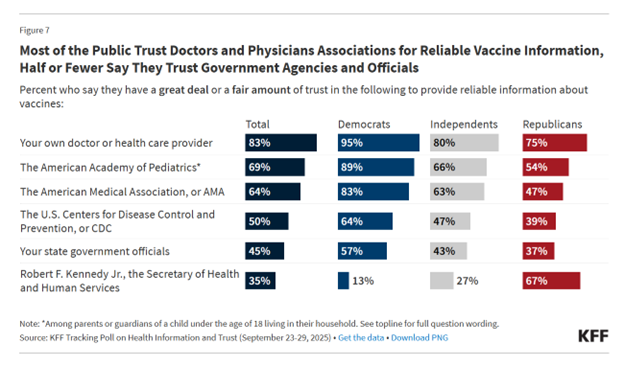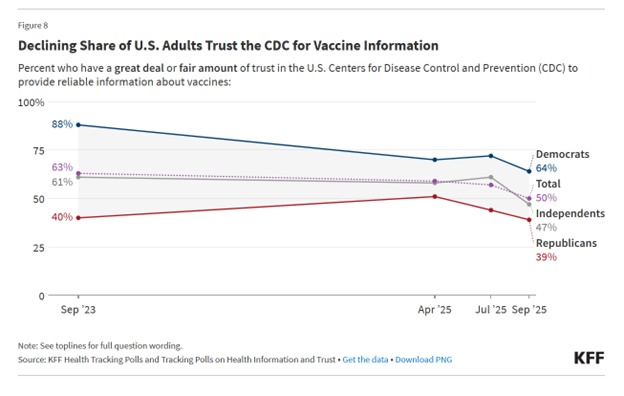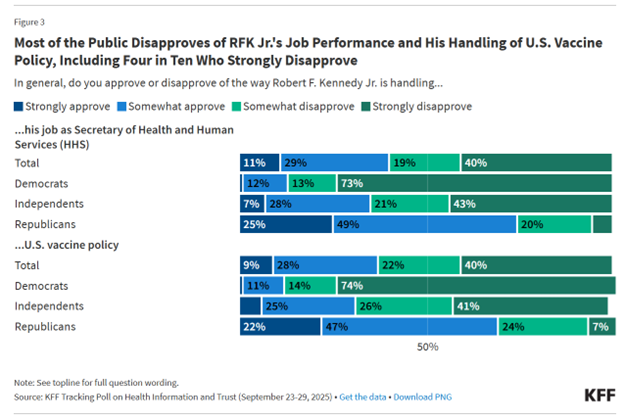HealthPopuli.com – Read More
One of the only uniting factors in U.S. health care across political parties is that most of the nation’s health citizens, cross-party ID, trust doctors and their professional associations for reliable information on vaccines. Pediatricians in particular are mostly-trusted for vaccine facts, according to the KFF Tracking Poll on Health Information and Trust: Tylenol-Autism Link and Vaccine Policies, the latest in the Kaiser Family Foundation’s series on Health Information and Trust Tracking Polls.

The biggest trust-chasm when it comes to sources for vaccine information is Americans’ split views on Robert F. Kennedy Jr., the Secretary of Health and Human Services: 67% of Republicans trust RFK on vaccines compared with only 13% of Democrats and 27% of Independent voter. Overall, only 35% of all Americans trust RFK on vaccines.

Under President Biden’s administration as the COVID-19 pandemic was flattening, more Republicans’ skepticism about the Centers for Disease Control (CDC) was waning.
In the Trump 2.0 era, we are now in a declining trust era among members of all political parties, shown in the chart labeled Figure 8.
Overall, 50% of U.S. adults have trust (net = “great deal” or “fair amount”) in the CDC to provide reliable information on vaccines, which breaks into the following segments by party: 64% of Democrats, falling from % in September 2023; 47% of Independents, falling from 71% in Sept. 2023; and, 39% of Republicans, roughly the same proportion in Sept. 2023.

The RFK, Jr., factor plays heavily into the declining trust among Democratic and Independent voters, illustrated by this chart (KFF report Figure 3).
In total, 59% of U.S. adults disapprove of RFK, Jr.’s, job as Secretary of HHS, with a whopping 86^ of Democrats disapproving and 64% of Independent disapproving. 74% of Republicans approve of RFK, Jr.’s, job in general.
For vaccine policy, we see roughly the same percentages of partisans disapproving/approving of RFK, Jr.’s, job specifically dealing with U.S. vaccine policy.

Health Populi’s Hot Points: If you are a parent with younger children, the issue of vaccinating your kids weighs heavily on you — both in terms of your own child and family, and then your local and community health and well-being.
This last chart is important in giving us a view into the minds of parents in light of whether people see vaccination as a parent’s personal choices versus opting into a broader responsibility to protect the health of others — in two words, public health.
The split ethos is clear here between individualism vis-a-vis community benefit and herd immunity: 74% of Democrats and leaners into Dem. believe more that vaccination is part of a responsibility to protect the health of others. 62% of Republicans and leaders into Rep. believe getting children vaccinated is a parent’s personal choice.
As I’m traveling and working in four European cities in these four weeks (second half of October, first half of November), I’m having scores of conversations about the tension between individualism vs. community/public health. The ethos in the UK, in Belgium, in Italy, and in the Netherlands is also in flux, albeit the lines across political parties less wide in disagreement as in the U.S. in this moment when it comes to health issues. Each of the 4 nations where I’m spending time has challenges with funding and budgeting their health care systems, a universal problem for all governments in 2025 and beyond. And all health citizens across these countries are facing higher prices for costs of living, whether housing, food, and as we approach the European winter, energy costs.
Stay tuned to my posts written from across the Atlantic over the coming several weeks with some US + UK + EU perspectives filtering into my observations.
The post A Chasm Between U.S. Health Citizens: Is Vaccination a Personal Choice, or for the Benefit of All? appeared first on HealthPopuli.com.





